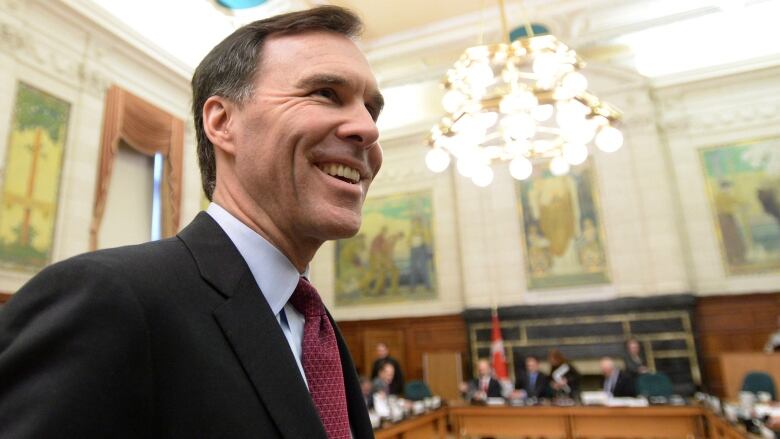Bill Morneau warns balanced budget could lead to recession
Finance minister defends Liberal government's willingness to run larger-than-expected deficit

Any effort to immediately balancethe federal budget might push the Canadian economy into a recession, Finance Minister Bill Morneau told a House finance committee today.
"To members of the opposition who have been less thanfully supportive of our plan, I invite you to consider the alternative," Morneau told MPs while testifying before the committee in Ottawa.
"The other parties who committed during the last election campaign to a balanced budget at any cost approach would be making cuts of tens of billions of dollars at precisely the wrong time. This would have led to massive job losses in a time of already high unemployment. This would have led to program cuts at a time when regions and population segments needs those programs most.
- Bill Morneau tries to reassure Canadians economic growth is worth a deficit
- Deficit has soared ahead of March 22 budget, Bill Morneau says
- Bill Morneau on the deficit: By the numbers
"To be frank, this likely would have led us into another recession."
On Monday, the Finance Department projected a possible deficit of more than $18 billion in 2016-17.
While the Liberalscommitted during last year's campaign to running deficits of no more than $10 billion, the federal government now argues that low oil prices and weak economic growth will necessitate a larger shortfall.
The government's $18-billion projection does not include the vast majority of Liberal spending promises, raising the possibility that the first federal budget for the new Liberal government will have a deficit of as much as $30 billion.
The Liberals have also moved away from committing to a return to balance by 2019.
Would balancing a budget put Canada in recession?
In question period, Conservative finance critic Lisa Raittquestioned the minister's supposition. "I have to ask the minister of finance this. Was he really serious when he said that running a balanced budget is going to put us in a recession?" she asked.
"Mr. Speaker, I was deadly serious," Morneau responded. "What the people on the other side of the House said, they saidthat what they wanted to do was balance the budget, at all costs, immediately. What that would mean is that we would have, right now, is tens of billions of dollars of cuts. Cuts that would increase our unemployment rate, that would reduce our ability to be flexible, that would certainly put us into a very difficult situation."
Raittsaid in response that "instead of worrying about what our great government would have done on this side of the House, perhaps he should worry a little bit more about what their government isn't doing on their side of the House."
Asked by reporters after question period about Morneau's suggestion of a recession if the budget was balanced, NDP Leader Tom Mulcair said in French that the finance minister was talking through his hat.
The case for investing
Testifying at committee,Morneaureiterated his government's argument for "investment," arguing that low economic growth is a reason for the federal government to intervene, while the country's relatively low debt-to-GDP ratio provides the government the "fiscal flexibility" to do so. Funding for areas like infrastructure and affordable housing, he argued,would both improve the current situation for Canadians and foster future growth.
Under questioning by Raitt, Morneauinsisted the Liberal government did not inherit a surplus from the previous Conservative government. The finance minister also said that the government is "committed to balancing the budget." But he added that his "first priority is to make investments in Canadians and in Canada."
Morneau defended the governmentsetting aside $6 billion as a "prudent" contingency in light of a volatile economic situation. When asked whether the Liberals might defer some of their campaign promises in light of the deficit situation, Morneausaid the government was committed to making investments to grow the economy, help and grow the middle class, and assist the most vulnerable.
Immediately balancing the budget, he repeated, "would force us to either significantly raise taxes or significantlycut spending."
"And neither of those alternativesare alternatives that we think make sense," he said."In the case of Alberta or Newfoundland and Labrador, as an example, the idea of raising taxes in either of those two places or, in fact, significantly cutting spending in those two places would not make any sense in the face of what those families are feeling right now in [those places]. We don't believe that the outcome would be any less than likely recession for our country if we were to take that approach at this time."
Shortly beforeMorneau'sappearance, the government confirmed that it will provide Alberta with approximately $250 million as part of the federal stabilization program, a fund that can be drawn from if a province experiences a year-over-year decline of more than five per cent in non-resource revenue.
- Alberta gets $250M in federal cash to help ailing economy
- N.L. to apply for federal cash to help its fiscal crisis
Kevin Page concerned
In an interview with CBC News, former parliamentary budget officer Kevin Page said he was surprised by the size of the change in the government's projections, from a $3-billion deficit to an $18-billion deficit.
Page also pointed out the government's decision to account for a weaker economy than what private sector economists had projected for the government.
"If they stuck to the average private sector forecast, I think we'd be looking at a deficit probablycloser to $11 or $12 billion for 2016," Page said. "So in that sense they've given themselves $6, $7 billion worth of wiggle room."
Page says the government should have providedmore detail to explain its projection.
"I think these big movements in numbers, with the lack of information and analysis, from a government that said they were going to be more transparent, more analytical, you do get concerned," he said.















_(720p).jpg)


 OFFICIAL HD MUSIC VIDEO.jpg)
.jpg)



























































































